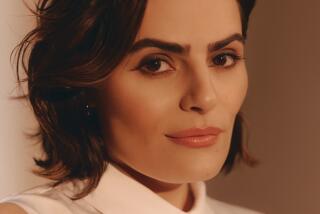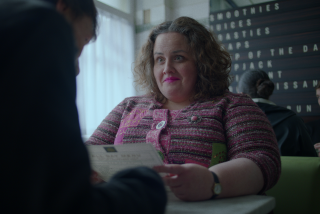‘Call the Midwife’s’ Pam Ferris talks birthing positions, fake babies
Pam Ferris, who plays the cantankerous nun Sister Evangelina on PBS’ “Call the Midwife,” is deep in conversation about her admiration for Anglican sisters (portrayed on the series) during a recent trip to Los Angeles — “they’re not judgmental” and “there’s no condemnation” and “when they sing together it’s so uplifting.”
Then things get serious.
“Oh, but I hate the wimple!” she said, referring to the garment worn around the neck and chin. “It’s such a constraint. Sure, it’s flattering. It’s like having a face lift! But then you can’t hear very well. Goodness, it can be annoying.”
PHOTOS: Hollywood Backlot moments
The 64-year-old German-born Welsh actress is part of the cadre of women in the British medical drama, which is based on the memoirs of the late Jennifer Worth and centers on a group of midwives and the nuns of nursing convent Nonnatus House in post-war London.
Its first season rolled out last fall on PBS and averaged 3 million viewers — not quite on par with “Downton Abbey,” but still impressive. Across the pond, its impact is less modest. It averaged about 10 million viewers with its second season that aired last year in Britain — placing it behind the third season of “Downton Abbey” as the highest rated drama of the year. That season will make its stateside debut Sunday (March 31) at 8 p.m. ET/PT.
So, naturally, talk of peeing in jars, successful sexual couplings, and plastic babies ensued:
Who knew a show about nuns and nurses would be so popular?
Isn’t it amazing? I’ve been in this business for 47 years, and a couple of times in my life I’ve made a program and everybody’s hoped it would do well, and they’ve done amazingly well. And this is one of them. I think if everybody knew what was going to be successful, we wouldn’t have any mediocre and failures. The first thing that frightened me was going out at 8 o’clock. I thought, ‘No, no. It’s just not going to work at 8, because we have a 9 o’clock watershed’ — I don’t know if you have the same thing? That really freaked me out. I automatically thought, ‘Well, we’ve lost a load of audience because they won’t watch it at that time.’ And I got letters — one in particular, I remember, from a woman that said she watched the show with her 12-year-old daughter and that it was marvelous because it opened up the conversation about reproduction. She said she was able to have a simple, explanatory conversation and I thought that was brilliant. I also thought the men would turn off, but my husband sits there and cries his eyes out. So I don’t have an explanation. It’s clearly touched something fundamental.
And I also think as an actor that this show is about as perfect of a drama as you can get. It’s got anticipation, it’s got climax, it’s got success and failure, it has joy and disappointment — it’s got everything.
PHOTOS: Hollywood Backlot moments
What has surprised you the most, in doing this show, about midwifery?
Well, I’ve never had children so I was able to learn a lot about the birth process that I otherwise didn’t know. I feel fully qualified to deliver anybody’s plastic baby. So, readers, if you’re having a plastic baby, call on me! But, yes, I’ve learned a heck of a lot about it, really. We were saying earlier today, it’s a pretty obvious thing, but it’s a bit mind-expanding to think each one of us are here as a result of thousands of historical, successful couplings — successful sexual couplings. The unsuccessful ones, we don’t know about! But the successful ones have ended up with little tiny babies. You can’t get more fundamental than that.
The show airs on PBS, which has seen massive success with “Downton Abbey.” Is there a feeling of being in the shadow of all that, or does it add a greater spotlight?
It’s not a surprise to me that they’re a big success. And I think their windfall has only been a good thing. It’s kind of opened the door for us. It’s won so many awards here, probably more than it has in Britain. It’s a hands across the sea kind of thing. I think it’s good that we share. But I do think the contrast between us and “Downton” is pretty dramatic. There’s not much dirt in “Downton,” but there’s a lot of dirt in our world. We are trying to be specifically truthful to an area and a period. They’re in a slightly more exotic world of glamour, which we don’t do at all.
You lived through the period the show explores, but you were obviously younger. Do you have a different perspective on what was happening, in hindsight, from doing the show?
I was 10, let’s say approximately, during this period. And my sister was 10 years older than me. She was giving birth at the time. She actually went through this kind of birth process, where, then, there was an approved position for birth. Lying on your left side with your right knee up towards your shoulder. Now, we go, ‘Do you want to lie, do you want to stand, do you want to hang from the chandelier, be in the swimming pool’ — so much has changed. They thought they were the cutting edge. People were still bringing in urine samples in jam jars and they were heated on a Bunsen burner. And they would get a false result because women hadn’t washed the jam out of the jar properly. It was very primitive. And tests for TB in a mobile testing unit, which we’ll see in the new season, was the height of progress, and the doctor is in there smoking a cigarette. We’re a strange mixture of a very interesting time just before the pill was invented.
I think people also don’t put it together, but it’s the same period that “Mad Men” explores, and yet your world was so different than our world. Admittedly, we’re looking at one of the poorest parts of England at that time, but when you compare “Mad Men” — and it seems absurd. I remember the limitations of the time. You could have fitted carpet, but you could only have it in three colors. And nobody would give you a sample, you just had it in green, brown or red. That was it. It was a very, very different time.
People love Sister Evangelina because she’s very blunt and crotchety. How do we see her evolve in the second season?
All I will say is that we’ll see more depth with her. I find her very moving because she’s a tough ol’ boot, and is happy to criticize. But she’s not just a tough ol’ boot. If we go back in time, she started forging her career, a medical career, at a time when women didn’t have any possibilities. But somehow she’s carved out a professional life for herself where she’s good at it. She exercises it daily. She has no personal reward aside from job satisfaction. And it works. I think that’s a very successful woman, considering the options that were available to her. If she’s about 60 at the time of the series, she was born in a 1900s world. There were no female doctors. You couldn’t become a female doctor so she did the next best thing. And she’s autonomous. Not many woman could be autonomous.
And I don’t want to give too much away about her relationship with Sister Monica. But I was sort of expecting Sister Monica to descend into dementia fast. And that was not the case. They’re playing around with it a bit, which is a nice idea. Dementia is so unpredictable.
There’s some great storytelling coming your way.
PHOTOS, VIDEOS & MORE:
PHOTOS: Behind the scenes of ‘Downton Abbey’
VIDEO: Winter TV preview
PHOTOS: Violence in TV shows
More to Read
The complete guide to home viewing
Get Screen Gab for everything about the TV shows and streaming movies everyone’s talking about.
You may occasionally receive promotional content from the Los Angeles Times.







